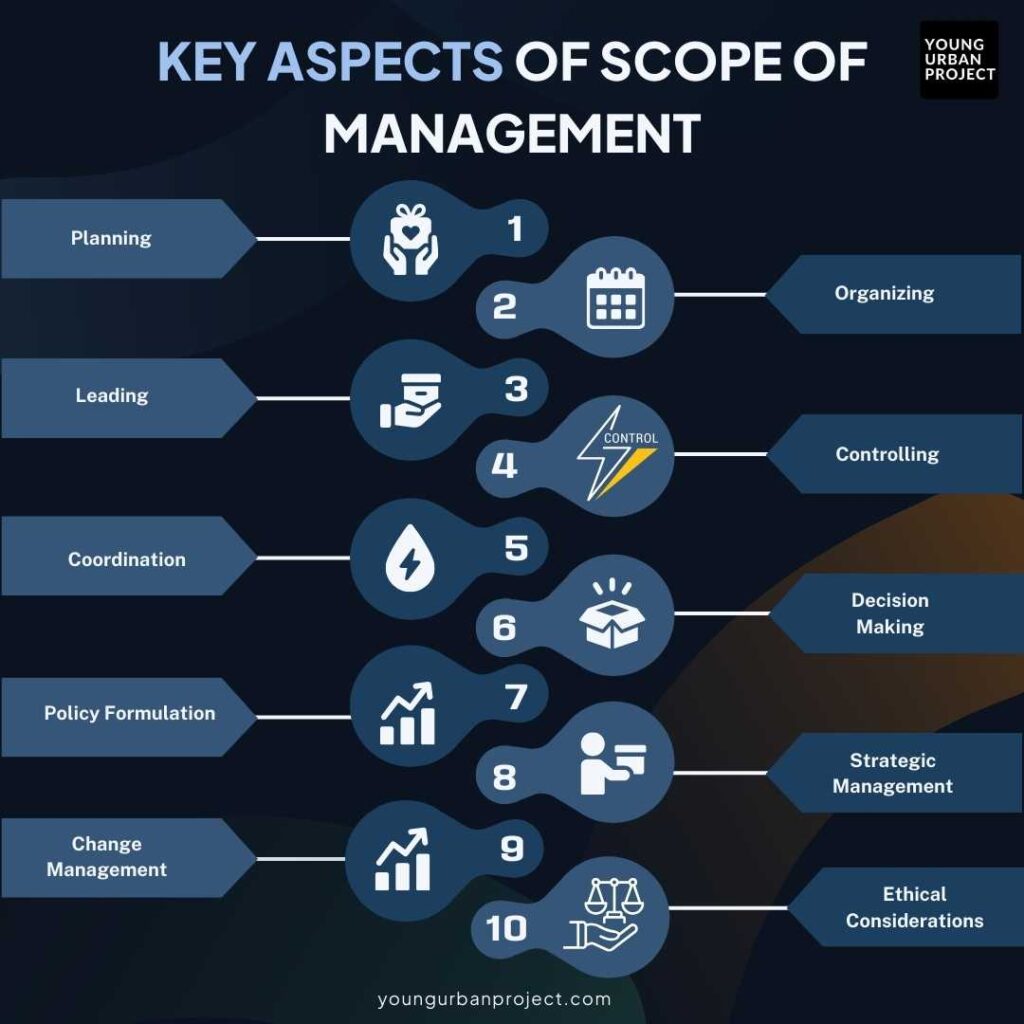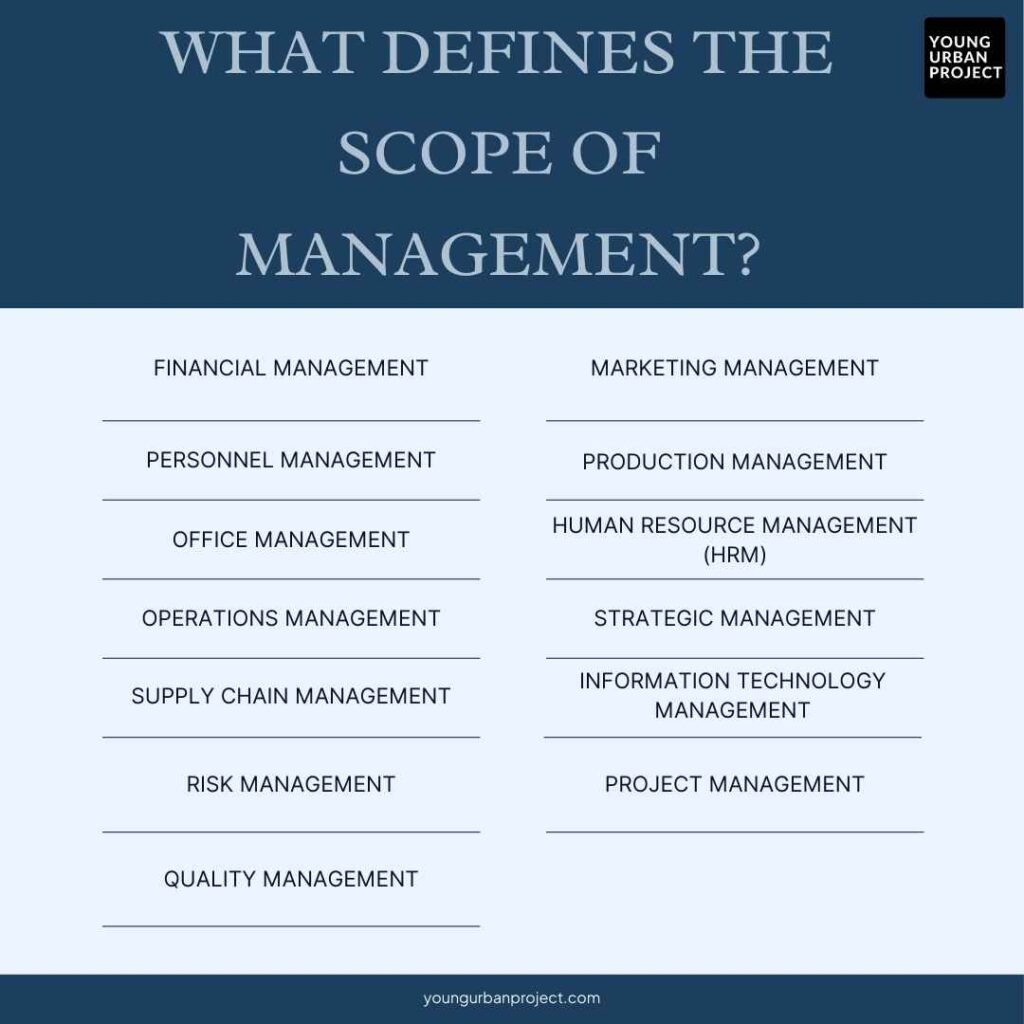What truly makes a manager effective? It’s not just giving orders or making big decisions. Management is the backbone of every successful business, whether it’s a startup or a global corporation.
Table of Contents
From planning and organizing to making strategic choices and handling ethical challenges, management covers a lot of ground. When done right, it keeps businesses running smoothly, teams motivated, and goals within reach.
No matter if you’re a seasoned leader or just starting a a management role, understanding its full scope is key to reaching your potential. In this guide, we’ll break down the essential elements, best practices, and steps to build a strong management framework. Let’s dive in!
What is Management?
Management is all about making things happen. It includes planning, organizing, leading, and controlling resources—like people, money, and materials—to achieve specific goals.
Think of it as the engine that keeps a business running. Managers set objectives, make decisions, solve problems, and guide teams to stay on track. But it’s not just about giving orders—it’s about leading, supporting, and helping people succeed.
Good management turns ideas into action and helps businesses grow, adapt, and thrive. Without it, even the best plans can fall apart.
Also read: What is Management and Why is it Important?
What is the Scope of Management?
Management isn’t just about making decisions—it’s about keeping everything in sync. From planning and organizing to leading teams and making strategic moves, a manager’s role covers a lot.
Think of it as the engine that keeps a business running. It includes handling finances, marketing, operations, human resources, and even manufacturing. Plus, managers need to navigate challenges like ethical dilemmas, policy-making, and adapting to market shifts.
Simply put, the scope of management defines what leaders are responsible for and how they drive success. When all these elements come together, organizations stay on track and achieve their goals.
Key Aspects of Scope of Management
From planning and organizing to making big decisions, it covers a lot! Here are the key aspects that make management work:

1. Planning: Setting the Game Plan
Before anything gets done, there needs to be a plan. Planning is about setting goals, figuring out what’s needed, and creating a roadmap to get there. It helps businesses prepare for challenges and stay on track toward success.
2. Organizing: Putting Things in Order
Once there’s a plan, it’s time to put it into action. Organizing means assigning tasks, setting up teams, and making sure everyone knows what they’re responsible for. A well-organized team avoids confusion and works together efficiently.
3. Leading: Guiding the Team
Good leaders don’t just give orders—they inspire and motivate. Leadership is about setting a vision, communicating clearly, and making sure the team stays engaged and productive. Strong leadership builds trust and helps teams perform at their best.
4. Controlling: Keeping Things on Track
Plans don’t always go as expected. Controlling means checking progress, comparing actual results to goals, and making adjustments when needed. It helps businesses stay focused and use resources wisely.
5. Coordination: Making Teams Work Together
A business has many moving parts, and they all need to work in sync. Coordination ensures different teams communicate well, avoid duplication of work, and move toward the same goals smoothly.
6. Decision-Making: Choosing the Best Path
Managers constantly make decisions, big and small. This involves analyzing information, weighing risks, and picking the best option for the company. Smart decision-making helps businesses grow and adapt to change.
7. Policy Formulation: Setting the Rules
Every company needs rules and guidelines to function properly. Policy formulation is about creating clear rules for employees to follow, ensuring fairness and consistency in decision-making.
8. Strategic Management: Planning for the Future
Short-term success is great, but businesses also need to think long-term. Strategic management focuses on setting big goals and creating strategies to stay ahead in the market. It’s what helps companies grow and stay competitive.
9. Change Management: Adapting to New Ways
Change is inevitable—whether it’s new technology, processes, or company structure. Change management helps businesses transition smoothly, making sure employees are prepared and productivity doesn’t suffer.
10. Ethical Considerations: Doing the Right Thing
Good management isn’t just about profits—it’s about fairness, honesty, and responsibility. Ethical management ensures companies treat employees, customers, and society with respect, leading to long-term trust and success.
Also read: What Is the PDCA Cycle? A Product Management Framework
What Defines the Scope of Management?

1. Financial Management: Keeping the Money in Check
Money is the backbone of any business. Financial management is all about planning, budgeting, and making smart decisions about spending and investments. It ensures a company stays profitable and can grow without running into financial trouble.
2. Marketing Management: Getting Customers Interested
Marketing is how businesses attract and keep customers. It involves researching what people want, creating products they’ll love, setting the right prices, and promoting them through ads and social media. Good marketing helps businesses grow and stay ahead of the competition.
3. Personnel Management: Taking Care of Employees
A business is only as strong as its people. Personnel management focuses on hiring the right employees, making sure they’re happy at work, handling salaries, and resolving workplace issues. When employees feel valued, they perform better.
4. Production Management: Making Products Efficiently
This is all about creating high-quality products while keeping costs low. It includes planning production schedules, managing materials, and ensuring goods are made on time. A well-run production system keeps customers satisfied and businesses profitable.
5. Office Management: Keeping Things Organized
Office management ensures that daily operations run smoothly. It involves organizing office supplies, maintaining equipment, and making sure employees have everything they need to work efficiently. A well-managed office leads to a more productive workplace.
6. Human Resource Management (HRM): Building a Strong Team
HRM focuses on managing employees from hiring to retirement. It includes training, performance reviews, and creating a positive work culture. Happy employees lead to a successful business.

7. Operations Management: Making Things Work Better
Operations management is about improving business processes, whether in production or services. It ensures that everything runs efficiently, from managing supply chains to improving customer service. The goal is to reduce waste and increase productivity.
8. Strategic Management: Planning for the Future
This area focuses on long-term goals and business strategies. It involves analyzing market trends, understanding strengths and weaknesses, and making smart decisions to keep the company competitive.
9. Supply Chain Management: Getting Products Where They Need to Be
A business needs a strong supply chain to deliver products on time. This includes managing suppliers, handling inventory, and ensuring smooth transportation. An efficient supply chain keeps costs low and customers happy.
10. IT Management: Using Technology to Grow
Technology is a game-changer for businesses. IT management ensures that computers, software, and networks work properly. It also helps companies use technology to improve communication, security, and efficiency.
11. Risk Management: Protecting the Business
Every business faces risks, from financial losses to cybersecurity threats. Risk management is about identifying potential problems and finding ways to prevent them. A strong risk management plan keeps the company safe and prepared for the unexpected.
12. Project Management: Completing Tasks on Time
Projects need to be planned, organized, and executed properly to succeed. Project management ensures that work is done within deadlines, budgets are met, and goals are achieved.
13. Quality Management: Delivering the Best Products and Services
Customers expect high-quality products. Quality management focuses on checking and improving products before they reach customers. It ensures customer satisfaction and builds a strong business reputation.
Also read: Product Lifecycle Management: Stages, Benefits and Evolution
How to Write a Scope of Management Statement

A well-written scope of management statement helps ensure the project stays focused and aligned with its goals. It outlines the key elements, such as purpose, deliverables, and timelines, to provide clarity and prevent misunderstandings. Here’s a guide on how to structure your scope statement:
1. Define the Project’s Purpose
Begin by clearly stating the project’s aim. This should describe why the project is being undertaken, its objectives, and the benefits it will provide. Highlight how the project fits into the overall corporate strategy and the precise results it seeks to achieve. A clear purpose directs and aligns everyone’s efforts.
2. List the Expected Deliverables
Outline the primary deliverables that the project will produce. This part should cover both concrete and intangible outcomes, such as products, reports, and services. Specify any performance or quality standards that each deliverable must meet. This ensures that stakeholders understand what to expect at every step of the project.
3. Provide the Project Timeline
The project timeline should include goals and deadlines that must be met. Include the beginning and end dates, significant phases, and activities. A detailed timeline helps everyone involved understand their duties and ensures that the project moves forward without delay. Make sure to include a buffer period for unanticipated setbacks.
Also read: Importance of Marketing Management
12 Tips for Effective Management
Good management is about leading a team in a way that keeps everyone motivated, productive, and happy. Here are some simple yet powerful tips to help you become a great manager.
1. Communicate Clearly
Good communication helps avoid confusion and keeps everyone on the same page. Talk to your team regularly, give clear instructions, and listen to their ideas. When communication is open and honest, teamwork improves, and people feel valued.
2. Set Clear Goals
Your team should always know what they’re working towards. Set specific and realistic goals that are easy to understand. Clear goals help people stay focused, work efficiently, and celebrate achievements along the way.
3. Trust Your Team
Give your team the freedom to make decisions and take responsibility for their work. When employees feel trusted, they become more confident and motivated. Offer guidance and support, but avoid micromanaging.
4. Build Strong Relationships
A good manager cares about their team members as people, not just employees. Take the time to understand their strengths, challenges, and goals. A supportive and friendly work environment leads to better teamwork and job satisfaction.
5. Lead by Example
Your team will follow your lead, so set a good example. Show up on time, stay professional, and work hard. If you demonstrate honesty, respect, and dedication, your team will do the same.
6. Solve Problems Quickly
Every workplace has challenges, but a good manager doesn’t ignore them. Instead, find the root cause of a problem, explore possible solutions, and take action. Staying calm and focused during tough times helps your team feel secure and confident.
7. Keep Learning
Great managers never stop learning. Stay updated on new management techniques, take feedback seriously, and be open to new ideas. Whether it’s reading, attending workshops, or learning from experience, continuous growth makes you a better leader.
8. Be Flexible
Change is inevitable. Whether it’s a shift in company goals or an unexpected challenge, staying adaptable is key. Being open to new approaches and adjusting your plans when needed keeps the team moving forward.
9. Give Regular Feedback
Employees want to know how they’re doing. Provide constructive feedback to help them improve and recognize their achievements to boost morale. When people feel appreciated, they work harder and stay engaged.
10. Handle Conflicts Effectively
Disagreements happen, but they shouldn’t disrupt the workplace. Address conflicts quickly and fairly. Listen to all sides, stay neutral, and work toward a solution that benefits everyone. A conflict-free environment keeps the team focused and stress-free.
11. Make Smart Decisions
Good decision-making is about gathering facts, considering different perspectives, and choosing the best option. Sometimes, tough decisions have to be made, but thinking things through and being confident in your choices earns your team’s trust.
12. Understand Emotions
A great manager is emotionally intelligent. This means understanding your own emotions and recognizing how others feel. Show empathy, stay calm under pressure, and be mindful of how your words and actions affect others. A positive and emotionally aware manager creates a workplace where people feel respected and motivated.
Conclusion
In conclusion, the scope of management encompasses a broad range of responsibilities that guide an organization toward its goals. From planning and organizing to leading, controlling, and decision-making, each element plays a crucial role in ensuring the smooth functioning of a business. Whether it’s handling financial resources, managing teams, or overseeing strategic operations, effective management is about balancing various aspects to create value and drive success.
Understanding the scope of management allows managers to make informed decisions, optimize resources, and build a strong organizational foundation. It’s not just about overseeing day-to-day tasks, but also ensuring that the business remains adaptable to change and responsive to challenges. By mastering key areas like human resource management, strategic planning, and project execution, managers can lead their teams to achieve both short-term objectives and long-term success. With the right approach, the scope of management becomes a powerful tool for driving growth and fostering a positive work culture.
Enroll Now: Product Marketing Course
FAQs: Scope of Management
1. What is the scope of management?
The scope of management refers to the various functions and responsibilities that managers must oversee within an organization. It includes key areas such as planning, organizing, leading, controlling, and decision-making, as well as more specialized functions like financial, human resource, and project management. These functions help achieve organizational goals and ensure smooth business operations.
2. Why is the scope of management important?
The scope of management is crucial because it ensures that all aspects of an organization work together toward a common goal. By defining responsibilities and focusing on key functions, managers can streamline operations, improve productivity, and achieve strategic objectives. A clear scope allows for better decision-making, resource allocation, and problem-solving, contributing to overall business success.
3. How can a manager effectively manage the scope of management?
A manager can effectively manage the scope of management by clearly defining roles, setting realistic goals, and establishing efficient processes. Regular communication, delegation, and performance monitoring are essential. By staying adaptable and proactive, managers can respond to changing business environments, ensuring that all functions remain aligned with organizational objectives and performance expectations.
4. What are the key areas within the scope of management?
Key areas within the scope of management include planning, organizing, leading, and controlling. These are supported by specialized functions such as financial management, human resource management, marketing, production, and strategic management. Each area requires attention to ensure smooth operations and alignment with overall organizational goals, making it critical to manage these effectively.
5. How does strategic management fit into the scope of management?
Strategic management is a core part of the scope of management, involving long-term planning and decision-making to achieve organizational goals. It helps identify market opportunities, assess competitive strengths, and adjust strategies to remain adaptable. By focusing on the bigger picture, strategic management ensures that day-to-day actions align with the company’s vision and long-term success.
6. How can managers ensure smooth coordination within the scope of management?
Managers can ensure smooth coordination by fostering clear communication and collaboration across teams. This includes defining roles and responsibilities, setting expectations, and encouraging teamwork. Regular meetings, project management tools, and shared goals help teams stay aligned, preventing misunderstandings and promoting cooperation to achieve common organizational objectives.
7. What is the role of ethical considerations in the scope of management?
Ethical considerations play a vital role in the scope of management by guiding decision-making, ensuring fairness, transparency, and responsibility in business operations. Ethical management builds trust with employees, customers, and stakeholders, fostering a positive reputation. By prioritizing integrity, businesses can avoid legal issues, enhance employee satisfaction, and maintain long-term sustainability.

